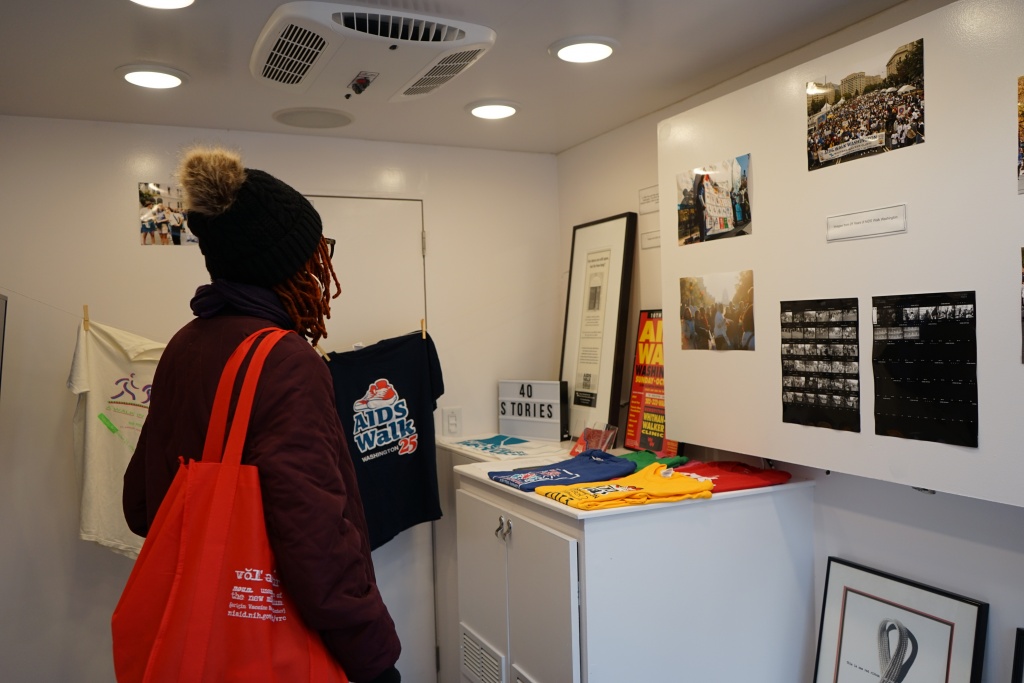On December 1, 2018, the 30th anniversary of World AIDS Day, the Humanities Truck joined thousands and participated in Whitman-Walker Health’s Walk & 5K to End HIV. Parked at Freedom Plaza, the Truck housed a pop-up exhibit entitled “We Can See the Finish Line:” Origins on the Walk & 5K to End HIV.
In January of 2018, Whitman-Walker Health celebrated its 40th anniversary of serving the greater Washington, DC region. Since 1973, Whitman-Walker Health has been a sanctuary for the underserved populations of DC, Maryland and Virginia. Through multiple sites in Washington, DC, staff provide stigma-free, culturally competent and vital healthcare to the gay, lesbian, bisexual, transgender and queer communities, as well to those living with or affected by HIV; and to individuals who cannot afford to pay or feel uncomfortable in other healthcare settings. Central to that 40th anniversary celebration was an investment in preserving an amplifying the history of Whitman-Walker. For Whitman-Walker, an essential aspect of that history is the power of community, and in this instance – the power of fundraising and responding to your community and loved ones in crisis.
For 32 years, Whitman-Walker and the greater Washington community gathered to show support and raise money for those living with or impacted by HIV/AIDS. The exhibit aimed to capture that history in a brief, accessible, and engaging pop-up experience for a range of visitors at the event. The exhibit traced the event’s history chronologically from its first iteration as The Next Step in June of 1987, to AIDS Walk Washington, to its current form as the Walk & 5K to End HIV. With thousands of people walking by on their way to register, listen to speakers, watch performers, or reflect on panels of the memorializing AIDS Quilt, the event necessitated an exhibit with introductory, but informative, text with images and culturally significant materials as the main draw. The exhibit relied almost exclusively on Whitman-Walker’s self-preserved archive of photos, posters, and t-shirts, including one designed by artist Keith Haring in 1989. The images and materials featured in the exhibit illustrated the history of the event, but more importantly, it highlighted the visible and continued presence of Whitman-Walker and community members in the DC fight against HIV – a fight spanning more than three decades.
Curated by Hannah Byrne, Organizational Archives Assistant at Whitman-Walker Health, the exhibit developed out of Whitman-Walker’s 40th anniversary digital storytelling project 40 Stories and the Whitman-Walker Health Oral History Project. Funded by the DC Oral History Collaborative, and housed at the DC Public Library (DCPL), the oral history collection explores the intersection of HIV/AIDS, Whitman-Walker Health, and Washington, DC. Selected clips from Whitman-Walker’s oral history collection played over the Truck’s internal speaker while people walked through the exhibit offering another level of engagement and reflection on Whitman-Walker’s history.
Find out more about Whitman-Walker’s history here! If you have questions or have a Whitman-Walker story to share, please contact Hannah Byrne at hbyrne@whitman-walker.org.
[supsystic-gallery id=22]


